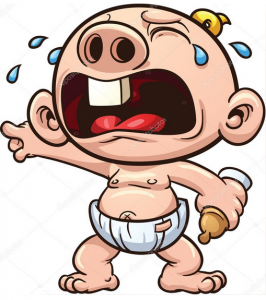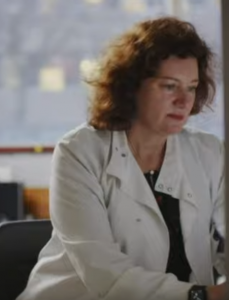I’ve often been publicly sceptical about some of the claims of genetic genealogy. “Ethnicity estimates”, in particular, seem to me about as scientific as the old apartheid test that marked a child as “nie blanke”. Does a pencil fall through their (straight European) hair or catch in their (kinky non-European) hair? University College London’s Department of Bio-sciences calls this stuff “Genetic Astrology“.
So I settled down to watch the BBC’s “DNA Family Secrets” with beady eye and curled lip at the ready. And ended up in floods of tears.
 There’s nothing innovative about the format or the production: each show takes three individuals or families who want to use DNA testing to answer a particular question, usually to clarify a missing family member. The questions are teased out, the telegenic scientist tells them how hard it’s going to be, they come back to find out the results and have their big reveal. Very little technical detail is included, but occasional glimpses do emerge of the vast amount of research done.
There’s nothing innovative about the format or the production: each show takes three individuals or families who want to use DNA testing to answer a particular question, usually to clarify a missing family member. The questions are teased out, the telegenic scientist tells them how hard it’s going to be, they come back to find out the results and have their big reveal. Very little technical detail is included, but occasional glimpses do emerge of the vast amount of research done.
For example, one Liverpool man with no idea of his father’s identity discovers he’s alive, in Ireland, with a fleet of children all delighted to discover the link.

But confirming that link needed a huge amount of work: first identifying a fourth cousin in the US via DNA; then locating the common ancestral family in nineteenth-century Ireland through documentary research; then working forward to uncover a range of possible living descendants/relatives; then persuading some of them to take their own DNA tests. The research work probably took more than a year, but only the end results are shown, taking about five minutes airtime. The BBC have deep pockets, and they use them well.
With the mystery solved and the new family revealed, though, the effect is extraordinary, and wonderfully touching. On every table between presenter and individual sits a large and necessary box of tissues. Deep pockets, used well.
Two general points in the end, I think.
First, DNA research can be astonishingly powerful. With work and care, it can fill in seemingly impossible gaps in family knowledge. But the same power can also throw up unexpected (non-televised) results that might easily damage existing families. So use with caution.
And second, the emotional impact of seeing fractured families heal is enormous, and makes terrific TV. Either that or I’m a big crybaby.
I have been through the DNA process after spending a good few years tracing my closest biological(?) family. You need a bit of luck with DNA, In that someone reasonably close to you needs to have taken the DNA test as well and then they need to be willing to talk to you.N.B. in my view ,you have no right to ruin peoples’ happy view of their immediate family. But if you are lucky you may find someone who is willing to share information. This only comes from careful questioning and building of trust. Do not rush it. Especially if the name comes up as Collins– you have very few other chances to determine which Collins is your relative! After that, you have to get through the unusual situation of knowing who your relative is, but not having the Certificate to prove is. Go easy. Will it ever get you an Irish passport?
Sometimes a huge amount of work and sometimes a few days depending on who else has tested. The programme makes out it’s a specialist job when in fact anyone with any nouse can do it. I’m just a regular genealogist but I’ve found missing parents/grandparents/great grandparents for numerous people using their DNA. Maybe I should call myself a genetic genealogist ?
I had a DNA test done about 4 years ago hoping to get some results for my French Grandfather’s family- he died when my Mom was young and they knew little about him. I had a match to someone about a 3rd cousin and he put me in touch with his Uncle. We were are somewhat skeptical this could be true but when I sent him a copy of 2 small photos of an elderly couple I thought might be my Great Grandparents he turned around and sent me the same photograph from his album- and I know he didn’t just send mine back because mine had been cropped and his was the full photo. Neither family knew the other existed and we have been able to reconnect and build a remarkable tree going back about 30 generations with documents proving it. It is astounding what you can find If you only know where to look and dna can give you that. I even found 4th cousins in Ireland but I wish Irish records were as accessible as French ones. The one thing it did was give me a place in Ireland to start looking- I had no clue where to start. To me dna was a wonderful tool.
I agree with you John on this particular programme, I had a similar reaction. Having recently started on my DNA journey I can appreciate the amount of time and effort these researchers have put into producing these programmes. There is also the element of not over promising the potential results from the researchers. They are preparing these brave individuals by effective counselling presumably off screen as well as on screen.
Ken
Oh I wish I had a specialist or 2 to help me and of course the money – that would be great!
It’s like watching who do you are and they manage to go back and finding incredible facts about their families.
I wish you’d talk more about the “ethnicity estimate” claims of certain DNA tests such as Ancestry’s. I don’t think people understand their results and why they often change with an update. A blog post from you on the topic could be helpful.
I agree!!
I have had my DNA tested and to my surprise, someone who I did not know contacted me. He said that he had also been through the DNA test. He told me he was raised as an adopted child. He was seeking the identity of his natural parents. He learned that he was born in a home for unwed mothers and that his mother was my aunt. The story was that she was unmarried at the time of his birth and he said she had an affair with a married man who worked at the same place of employment. The story ended with my aunt giving up the newborn for adoption. All this occurred before I was 8 years of age. He wanted to befriend me. I thought that if my aunt did not want me to have a cousin, I would respect her wishes. That ended this saga.
John Cochran,
If that’s your wish that’s fine but who knows your aunts wishes. Is she alive to ask ? Maybe she would have wanted him included in the family but did not know how to find him after giving up the child. Or maybe she was afraid how others would react. It takes a lot of courage to reconnect broken families.
John,
Whilst I can appreciate it was a surprise- but in taking a DNA test there surely is a strong possibility of being contacted by someone you didn’t know?
My mum was adopted and I’ve attempted to reach out to a number of people on ancestry to no avail. As Pam says, it takes alot of courage to risk potential rejection again. That said, everyone has the right to their past -but with massive advances in technology I think the phrase ‘the truth will out’ jumps to mind.
Unfortunately, unmarried women’s wishes were rarely considered. Usually they were told what was going to happen, and “to forget about it” by their parents and the home.
Turi confirmed to me on twitter that they only research the stories shown on the show – so there are no cases where they research didn’t pan out and they abandoned the person (unlike WDYTYA).
I also would like to see them ignore the ethnicity angle a bit more. But anything that encourages more people to do DNA tests or research their ancestry is great. I cried on the most recent one from this week.
Hi Claire. Thanks for this. I’ve now amended the post to reflect the true state of affairs.
I have had 4 adopted people show up as DNA matches to me and my family. One of whom I helped to re-unite with their father a second cousin of my mother’s who I had always known, but had no idea he had a child. Even his cousins didn’t know this. Initially I was the go between. For them passing messages.
I then left things to them to sort out. This was very stressful. However, they eventually did meet up with each other.
The others were more distant relatives.
Ancestry’s new toy says my sister and I do not share the same parents. Their ethnicity estimates don’t always show our 2 German grandmothers, one on each side, both 1st generation born in America.